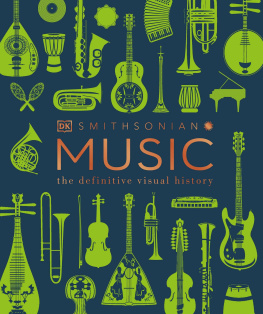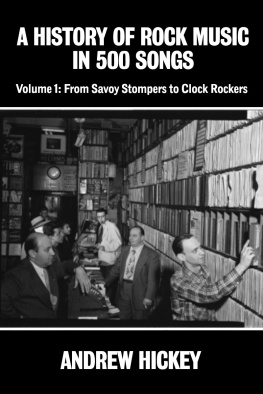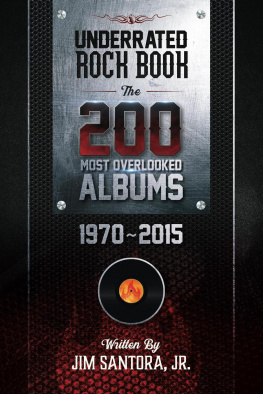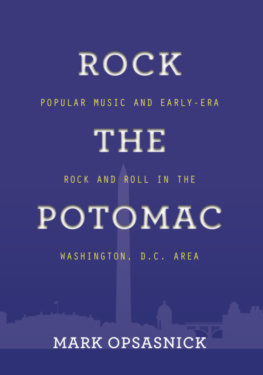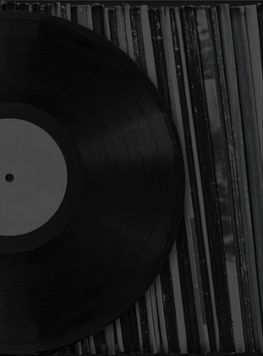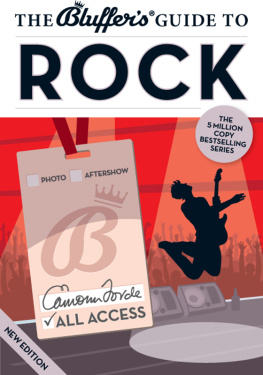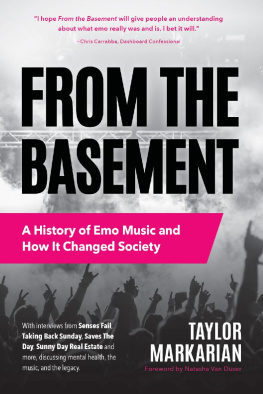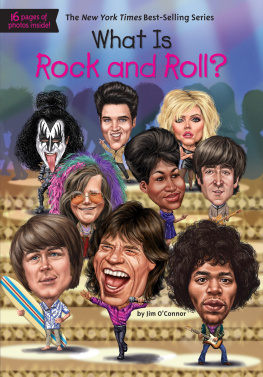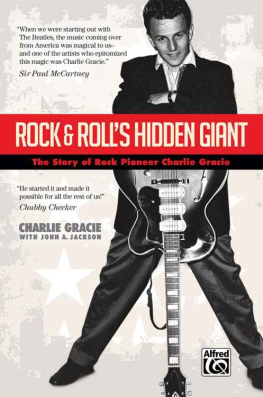A History of
Rock and Dance Music
From the Guitar to the Laptop
From Chicago to Shanghai
Volume 1 (1951-1989)
*
Piero Scaruffi
*
2009
*
"If I were not a physicist, I would be a musician"
( Albert Einstein )
"Most rock journalism is people who can't write, interviewing people who can't talk, for people who can't read"
( Frank Zappa )
Scaruffi, Piero
A History of Rock and Dance Music
All Rights Reserved 2009 by Piero Scaruffi
Volume 1: ISBN 978-0-9765531-5-1
Rock, Heavy metal, Psychedelia, Progressive, Ambient, Electronic, Singer-songwriter, Disco, Rap, Hip-hop, Funk, Techno, House, New Wave, Punk, Industrial, Hardcore, Pop, Noise, New Age, World-music, Grunge, Emo, Grind, Doom, Drumnbass, Trip-hop, Glitch
For information: www.scaruffi.com
Printed and published in the USA
Photo credits: Piero Scaruffi
No part of this book may be reproduced or transmitted in any form or by any means, graphic, electronic or mechanical, including photocopying, recording, taping or by any information storage retrieval system, without the written permission of the author (http://www.scaruffi.com)
Contents
VOLUME 1
Preface
From Subculture to Counterculture (roughly 1951-66)
Background: The 20th Century
Rock'n'Roll 1951-57
Before the Flood 1957-1962
Trouble in Paradise 1961-1964
The Flood 1964-1965
Paradise Reborn 1963-1965
The Counterculture 1965-66
Minimalism and Electronics
The Classics (roughly 1966-1969)
The Late 1960s: The Democratization of Politics 67
Psychedelia 1965-68
The Age of the Revivals 1966-69
Solo Careers 1967-69
Electronics and Rock 1968-70
Progressive-rock 1968-72
Canterbury 1968-73
Kosmische Musik 1969-72
Hard-rock 1969-73
The Seventies (roughly 1970-75)
The Early 1970s: A Crisis of Confidence
Psychedelic Madness 1970-74
Re-alignment 1970-74
Singer-songwriters 1970-74
Decadence 1969-76
Sound 1973-78
The Auteurs 1975-82
Disco-music 1975-80
Punk and New Wave (roughly 1976-88)
The 1980s: The Last Gasps of the Cold War
The New Wave
Punk-rock
The Blank Generation
American Graffiti
British Graffiti
Dance Music for Punks
Gothic Rock
Industrial Music
Hardcore
College-pop
The New Wave of Pop and Synth-pop
Neo-progressive
Noise-rock
Psychedelic Underground and Dream-pop
The Golden Age of Heavy Metal
Singer-songwriters of the 1980s
Cow-punks and Roots-rock of the 1980s
DJs, Rappers, Ravers
The New Age and World-music
Shoegazing and Space-pop
Extreme Hardcore
Industrial-metal
Punk Crossovers
Between Acid-rock and Industrial Music
Between Noise-rock and Post-rock
From Computer Music to Collage
VOLUME 2
The Indie Revolution (roughly 1989-1994)
The Early 1990s: After the Cold War
Female Rock
Post-rock
Noisier than Rock
Progressive Sounds
Psychedelic Songwriting
Garage Music for the Generation X
Lo-fi pop
Between Individualism and Populism
The Second Coming of Industrial Music
Slo-core
Dance-music in the Age of House
Foxcore
Brit and non-Brit pop
Alt-pop
Grunge
The Golden Age of Hip-hop Music
Roots-rock in the Age of Alt-country
The Age of Emocore
From Grindcore to Stoner-rock
Gothic Rock
Post-ambient Music
Concrete Avantgarde
The Cyber Age (roughly 1995-2001)
The Late 1990s: Globalization
Drum'n'Bass
Trip-hop
Post-post-rock
Ambience
Africa
Glitch Music and Digital Minimalism
Exuberance
Transcendence
Violence
Confusion
Depression
Doom
Hip-hop Music
Digital Avantgarde
The Digital Age (roughly 2001-08)
The 2000s: Decade of Fear
DJs and Rappers
Bards and Dreamers
Tunesmiths
Populists
Intellectuals
Clubbers
Rockers
Trippers
Appendix
Chronology of Events
Selected Discography
Alphabetical index
Preface
There is not one single history of rock music. There are several.
There is the history of the hits. Most books on rock music are histories of the hits. The charts decide, i.e. the masses decide. Marx would have loved it, except there is a catch: the masses tend to buy what is publicized by the media, which is what corporations pay money to publicize. Marketing decides the charts. Invest a few million dollars on me and even I, regardless of my musical talent, will break into the charts, i.e. will become part of "that" history of rock music. Most books on the subject are, in fact, books about the music industry. Very often, the profile of a musician is simply a list of her/his successes in the Billboard charts ("that album broke into the charts", "that album hit #5", "that album sold one million copies"). In other words, books on rock music tend to treat musicians like corporations or start-ups, judging them by their revenues, profits and marketing strategy.
Then there are national versions of the history of rock music. Italians have been more exposed to British music than USA music. The Eagles and Creedence Clearwater Revival are hardly known, whereas the Moody Blues and David Bowie are almost household names. The history of rock music viewed from Italy is sharply different from the history of rock music viewed from, say, Boston.
Finally, there are the individual histories of rock music. Each person grew up with a different set of idols, and tends to center the history of rock music around those idols, whether Led Zeppelin or Doobie Brothers.
My history of rock music is not a history of the charts (which i consider an aberration), it is not a national version (i have lived in three continents and have traveled to some 120 countries), and it is not an individual version (i grew up with classical music, literature and science, not with rock music).
I simply listened to a lot of music, researched the origins of the various styles, and drew my conclusions. Very often, i was unaware of how many records an artist sold (I learned it later, when thousands of fans sent me nasty complaints). Very often, i am unaware of what was popular in Italy or Boston.
Also, i feel no particular sympathy for any rock musician. My "idols" are Ernst, Shostakovic, Pessoa, Coltrane... not rock musicians.
This is the most subjective history of rock music that one could possibly write; but also the most impartial, independent, and balanced.
It ends up being mostly a history of "alternative" rock music. While this is a gross approximation, it has become customary to separate "mainstream" music and "alternative" music. If you do what i did (listen to the music without letting marketing & sales influence you), it is very unlikely that you will end up selecting the musicians who topped the charts, and very likely that you will be impressed by countless obscure recordings that were twenty years ahead of their time even though nobody heard them.
Fans of mainstream music will claim that it all boils down to personal taste. I beg to disagree. There is an absolute factor that bestows a form of primacy on alternative music. Tell anyone (alternative or mainstream musician) that s/he is playing mainstream music and s/he will get upset. Tell anyone (alternative or mainstream musician) that s/he is playing alternative music and s/he will be flattered. Fans may buy according to the media and to marketing campaigns, but they, too, implicitly recognize the primacy of alternative music. If you tell a Beatles fan that the Beatles were mainstream, you risk your life. The evidence is just overwhelming: even the most mainstream musicians tacitly agree that alternative music is more important, and even the masses that buy mainstream music tacitly agree that alternative music is more important.
Next page

